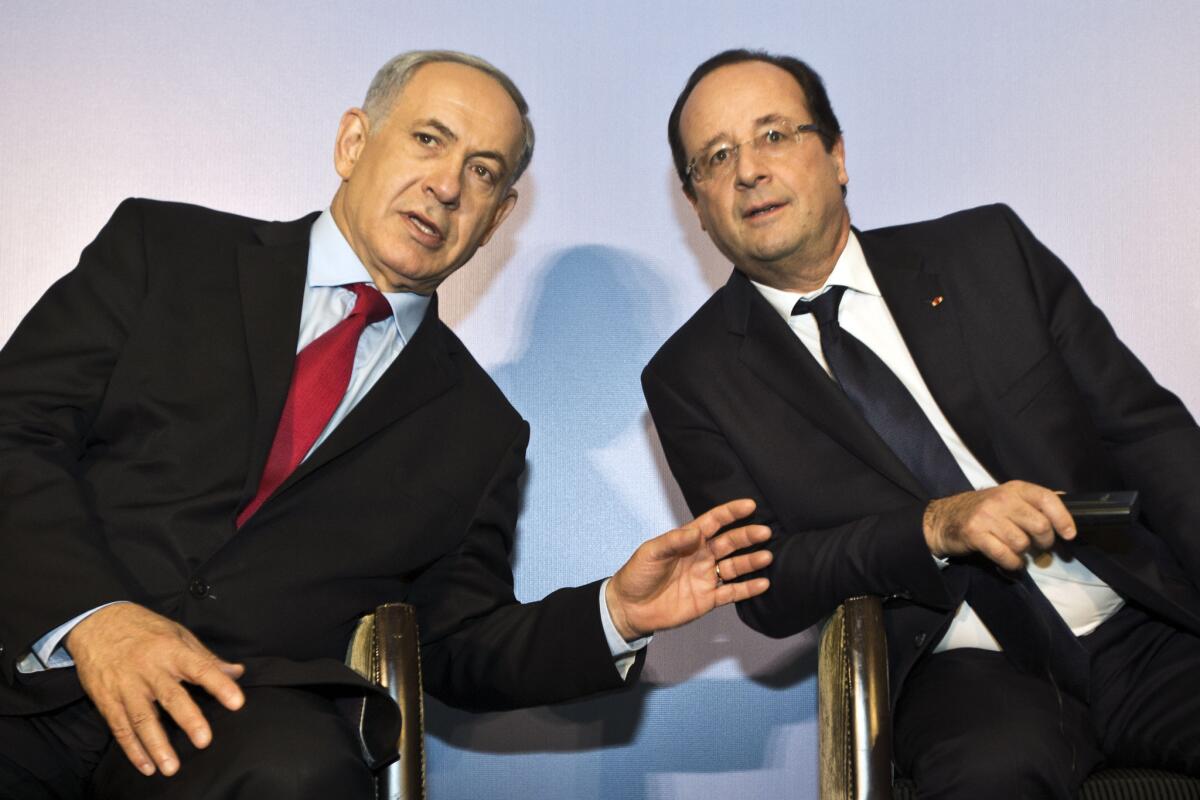As talks resume, Israel still hopes to influence deal with Iran

- Share via
JERUSALEM -- With talks toward an interim deal on Iran’s nuclear program resuming Wednesday in Geneva, Israel scrambled to use its narrowing window of opportunity to influence the negotiations.
For weeks, Israeli Prime Minister Benjamin Netanyahu has taken every opportunity to warn against easing international sanctions on Iran before Tehran takes steps he views as sufficient to prevent it from developing nuclear weapons.
This week, he told visiting French President Francois Hollande: “Iran’s dream deal is the world’s worst nightmare.”
Netanyahu’s position remains that any agreement must include Iran’s halting all enrichment of uranium, removing amassed fissile material and stopping work on the heavy water reactor that could offer it an alternative route to a bomb, which many nations fear is Tehran’s goal despite its denials.
Easing sanctions for anything less than these terms would allow Iran a big break in return for nothing, Netanyahu argues.
An interim agreement that Israeli officials fear might be reached would signal to Iran that the international community wants to clear its table of this issue as quickly as possible, said Israeli lawmaker Tzahi Hanegbi, who warned that such a deal would weaken whatever permanent agreement is eventually negotiated.
Israel has been surprised and frustrated by the willingness of the six major powers meeting with Iran -- the U.S., Britain, China, France, Germany and Russia -- to offer an easing of sanctions at an early stage, the lawmaker said in a press briefing in Jerusalem.
“For a decade they told us, ‘Hold your horses, don’t do anything stupid, we found the way to deal with it through sanctions,’” said Hanegbi. Now that sanctions have brought Iran to the table, the powers should make the most of them to fully dismantle Iran’s military capabilities, he said.
As the negotiators gathered in Geneva, Netanyahu took his campaign to Russia for a two-day visit that will include discussions about Iran with President Vladimir Putin.
Israel does not expect the bilateral meetings to yield a dramatic breakthrough, according to Deputy Foreign Minister Zeev Elkin, noting that if France is considered closest among the six powers to Israel’s positions, Russia is on the other end of the spectrum. For this reason, he said, “any move at all in Russia’s position can influence the outcome.”
This approach signals a shift among Israeli officials’ efforts toward damage control, with Israeli media reporting Wednesday that the country was seeking a mechanism in the deal that would automatically restore full sanctions if a six-month interim agreement fails.
After going all out against a deal and publicly clashing with the U.S. in the process, Israel should reposition itself in support of a good agreement, former national security official Chuck Freilich told Israel Radio on Wednesday. “The train for preventing a deal has left the station,” he said.
An agreement might be “the lesser of evils” but without reaching one, Israel might soon face two bad options, Freilich said: “a military strike, or living with a nuclear Iran.”
According to Hanegbi, the national security concept behind Israel’s 1981 bombing of an Iraqi reactor remains valid.
“Israel cannot live under a nuclear umbrella” of regional regimes, he said. Still, the lawmaker acknowledged that a military strike would “not be as powerful or effective as ending Iran’s nuclear program by diplomatic channels.”
ALSO:
Obama asks Senate leaders to hold off on new Iran sanctions
Mexican cartels abet heroin and meth surge in U.S., DEA study says
A Russian horror story: Gang sentenced for 12 murders at family home
Sobelman is a news assistant in The Times’ Jerusalem bureau.
More to Read
Sign up for Essential California
The most important California stories and recommendations in your inbox every morning.
You may occasionally receive promotional content from the Los Angeles Times.













